- Home
- Studs Terkel
The Studs Terkel Reader_My American Century Page 11
The Studs Terkel Reader_My American Century Read online
Page 11
I’m so poor, baby,
I have to lean against the fence to gabble.
Yeah, now, baby, I believe I’ll change town,
Lord, I’m so low down, baby,
I declare I’m looking up at down.
The men in the mine, baby,
They all looking down at me....
—BIG BILL BROONZY
Here the images blur and time turns somersaults. It is the year of Repeal. A classmate and I appear at suddenly-legal taverns. A ritual, in the spirit of the day, comes into play: the house “pops” for every third beer.13 It was so in all the taverns we visited. Today, it is a custom more honored in the breach than in the observance.
None I know was more rewarded by the triumph of the Wets than the coppersmith, old Heinicke. He had been the lobby elder, ill, hard of hearing, grown weary with life. Suddenly, his services were in desperate demand by any number of breweries. The shortage of skilled coppersmiths was in direct ratio to the unslaked thirst for beer.
As a result of the six-day week he was putting in, the unexpected harvest of money and, most significantly, the delight in his skills, he was transformed, Faustlike, into a younger man. His newly purchased, superheterodyne radio set, in a baroque cabinet that occupied half his room, was heard loud and clear in all fifty quarters. Ascribe it to his exhilaration as much as to his deafness.
As for the others, political argument, often bitter, often hilarious, replaced desuetude. Aside from F.D.R.’s fireside chats, on Sundays a new voice dominated the lobby. It was Father Charles E. Coughlin, coming through the box radio, high on a wooden pedestal. There were those who muttered, “Turn the Roman off.” But it was Matthew McGraw, our gaunt, bespectacled, fiery-eyed night clerk (his resemblance to Father Coughlin was remarkable) who insisted the voice be heard.
Matt was something of an intellectual. Before the Crash, he had been a master carpenter. He was constantly quoting from books, weeklies, and monthly radical journals. He inveighed against the moneyed interests, against the privileged, against monopoly. He quoted Debs, Darrow, Paine.... Somewhere between October, 1929, and November, 1934 (when the Union for Social Justice was formed), something had happened to Matthew McGraw. A forgotten man, his cup of wormwood had flowed over.
A printer remembers his father swinging from Bob La Follette, Wisconsin’s progressive Senator, to Father Coughlin. The hurt, frustrated man, hearing of the powerful, alien East, sought an answer. So did the gentle, soft-spoken salesman, who hardly questioned anything. “He has the right idea,” his daughter remembers him saying of the priest from Royal Oak. The salesman had voted for Roosevelt.
It was 1936. Having long abandoned any thoughts of following the law, I joined the Illinois Writers’ Project. I was a member of the radio division. We wrote scripts inspired by paintings at the Art Institute. They were broadcast over WGN, the Chicago Tribune’s station. Colonel McCormick, the publisher, was quite proud of these contributions to the city’s culture. Though the front page of his paper invariably featured a cartoon of a loony, subversive professor in cap and gown, or a WPA boondoggler leaning on his shovel, he saw no inconsistency in programming the Great Artists series, with credits: “...under the auspices of the Works Progress Administration, Harry Hopkins, Director.” I am told he listened to them regularly, with a great deal of pleasure.
By chance, I became a gangster in radio soap operas, among them, “Ma Perkins,” “Betty and Bob” and “First Nighter.” The jobs were fairly frequent, but tenure was lacking. Cause of dismissal: Electrocution, life imprisonment, or being shot to death.
As the fervor of unionism spread, with an assist by the Wagner Act, the American Federation of Radio Artists was formed. There was hardly any dissent among the performers. There were, of course, obstinate executives, who played Canute, but the waves rolled over them. The climate, in this instance, was salubrious.
Not so, with other professional unions. The Newspaper Guild, for example. Perhaps my most vivid single memory—certainly my most traumatic—of the Thirties, with which I bring these impressions to a close, concerns this battle in Chicago. The Hearst morning newspaper, the Herald-Examiner, was suffering a long and critical strike. Outside the building, journalists picketed. The Hearst delivery trucks were manned by a hard lot; some I remembered as alumni of my high school; some with syndicate friendships. They were employed in a dual capacity: as delivery men and as terrorists. Whenever the situation presented itself, they’d slug a journalist-picket.
I see a tableau: a pale, bloodied reporter lying on the pavement as colleagues and passersby stare in horror. In the middle of the street stands a squat heavyweight, an auto jack in his grasp. His arms and legs are spread-eagled. He appears to be challenging all comers. Yet, I see, quite unblurred, the terror in his eyes.
The rest is history, which I leave to those whose less-flawed memories and reflections comprise this book.
ED PAULSEN
From 1926 on, when he was fourteen, he knocked around and about the states—“I rode the freights” across the land. “I always went back to my home in South Dakota. My sister and her husband had a little farm. It was a retreat. I played semi-pro baseball up there at one time. You know who I faced? Satchell Paige. He was pitching for Bismarck. I worked punching cattle, $10 a month. I was never satisfied to stay there. I was always taking a pop at LA or San Francisco.
“Everybody talks of the Crash of ’29. In small towns out West, we didn’t know there was a Crash. What did the stock market mean to us? Not a dang thing. If you were in Cut Bank, Montana, who owned stock? The farmer was a ping-pong ball in a very tough game.
“I finished high school in 1930, and I walked out into this thing....” He picked apples in Washington, “hustled sheets” in Los Angeles, and worked on road gangs all along the coast. “It got tougher. We didn’t know how to make out in the city. It was terrifying. There were great queues of guys in soup lines. We didn’t know how to join a soup line. We—my two brothers and I—didn’t see ourselves that way. We had middle-class ideas without a middle-class income. [Laughs.]
“We ended up in San Francisco in 1931. I tried to get a job on the docks. I was a big husky athlete, but there just wasn’t any work. Already by that time, if you were looking for a job at a Standard Oil Service Station, you had to have a college degree. It was that kind of market....”
I’d get up at five in the morning and head for the waterfront. Outside the Spreckles Sugar Refinery, outside the gates, there would be a thousand men. You know dang well there’s only three or four jobs. The guy would come out with two little Pinkerton cops: “I need two guys for the bull gang. Two guys to go into the hole.” A thousand men would fight like a pack of Alaskan dogs to get through there. Only four of us would get through. I was too young a punk.
So you’d drift up to Skid Row. There’d be thousands of men there. Guys on baskets, making weird speeches, phony theories on economics. About eleven-thirty, the real leaders would take over. They’d say: O.K., we’re going to City Hall. The Mayor was Angelo Rossi, a dapper little guy. He wore expensive boots and a tight vest. We’d shout around the steps. Finally, he’d come out and tell us nothing.
I remember the demands: We demand work, we demand shelter for our families, we demand groceries, this kind of thing.... Half the guys up there making the demands were Negroes. Now there wasn’t a big black colony in San Francisco in those days. But they were pretty cagey, the leaders—they always kept a mixture of black and white.
I remember as a kid how courageous this seemed to me, the demands, because you knew that society wasn’t going to give it to you. They’d demand that they open up unrented houses and give decent shelters for their families.14 But you just knew society wasn’t yielding. There was nothing coming.
This parade would be four blocks long, curb to curb. Nobody had a dime. There were guys on the corner trying to sell apples to this moneyless wonder. [Laughs.]
The guys’d start to yell and there come some horses. They used to have
cops on horseback in those days. Then there’d be some fighting. Finally it got to killing. I think they killed three people there that day, besides the wounded. It really got rough because the guys had brought a bunch of marbles and threw them on the street, and the horses were slipping and sliding around. This made the cops mad and they got rough.
There’d be this kind of futile struggle, because somehow you never expected to win. We had a built-in losing complex. That’s the way those crowds felt. A lot of them would drift back into the Sally. 15 By now it’s one o’clock, and everybody’s hungry. We were a gentle crowd. These were fathers, eighty percent of them. They had held jobs and didn’t want to kick society to pieces. They just wanted to go to work and they just couldn’t understand. There was a mysterious thing. You watched the papers, you listened to rumors, you’d get word somebody’s gonna build a building.
So the next morning you get up at five o’clock and you dash over there. You got a big tip. There’s three thousand men there, carpenters, cement men, guys who knew machinery and everything else. These fellas always had faith that the job was gonna mature, somehow. More and more men were after fewer and fewer jobs. So San Francisco just ground to a halt. Nothing was moving.
We were always trying to get to sea, but I didn’t have any ticket. Oh, I made that waterfront a thousand times. There used to be those great old liners that sailed out to Hawaii. You could hear the band play “Aloha Away,” and all the guys were standing there with tears in their eyes. As though you had somebody going some place. And you didn’t know a damn soul. [Laughs.]
We weren’t greatly agitated in terms of society. Ours was a bewilderment, not an anger. Not a sense of being particularly put upon. We weren’t talking revolution; we were talking jobs.
We’d grown up in small-town high schools. There wasn’t much expression, in the press, of the intelligentsia. It was just a tough world, and you had been born into it. I had no great sense of fervor until I went to L.A. and ran into Upton Sinclair in 1934. If I were picking a time when I began to say, “What the hell’s this all about?” it came when I wandered into a meeting one day where Upton Sinclair was talking.16 This was the winter of ‘33, ’34. There was this little pink-and-white guy up there speaking, the least likely guy ever to be a radical you ever saw. You automatically think of pince-nez glasses and a shock of white hair. His audience was made up mostly of working stiffs.
He pointed out the great piles of oranges, the piles of lumber laying there idle.... They’d put up a rick of oranges and apples, put gasoline over it and set fire to them. Vegetables were being destroyed and everything. Everybody who cried so much later about federal programs destroying little pigs ... they should have seen what industry was doing at this time. To keep the price up.
Sinclair’s idea was to relate the unemployed to the resources not being used. This appealed to me tremendously. It made sense to have this food eaten up by hungry people. I got a job singing with the quartet that was campaigning with him.
If I had to pick one constant enemy during this time, it was the American Legion. They were made up of home guard types. They were the most vicious enemies of this drifting, reckless, hungry crowd of people. Every place I went, Hoovervilles—they were raided. This bunch of Legionnaires with those damn caps on. Guys with baseball bats, driving them out of the jungles around the railroad grounds. Even in the little towns I lived in. I had a war with those guys by the time I was in high school. They were always the bane of my existence.
They were the Main Streeters. They were doing all right. Merchants, storekeepers, landowners. They had a fix that was just awful to live with. They were hard on the little candidate for Governor. They’d come to his meetings with baseball bats and clubs and break it up. Once, when we sang in the Valley, they attacked us and beat the hell out of us. We barely got out of there.
During the Sinclair campaign, I was going to the library, picking up books I’d never read before, books that never crossed my track. You’d go down to look for work in the morning, and then you’d give up at eleven o’clock and drift into that library. I got my education there, really.
By this time, Roosevelt was President. There was the NRA...mystical things were going on we didn’t understand at all. People were talking price-fixing and what have you. Very, very weird world. It didn’t mean a damn to us. There were three brothers of us, we got a freight and went down to Portland. They’d started to work on the Bonneville Dam. Beautiful sight down that river. On a decent day, if you set on top of a box car, it was beautiful....
We drifted down to the jungle. We go into a beanery, ’cause there was no train out till eleven that night. In comes a Mexican whore and a colored whore. They order a hamburger. The proprietor says, “I don’t serve niggers. Get that dame out of here.” The Mexican girl comes back and orders two hamburgers. The guy grumbles, fries up a couple. The colored girl walks in. This guy goes under the counter and comes up with a sap.17 He lashes out at the girl’s head, bong! Jeez, I think he’s killed her. She groans and staggers back off this stool. He cuts around the corner in a wild rage. I put my foot out and trip him. He just went ass over Tecumseh. The girls get out in time. He’d a killed that girl, I believe. We lam out of there, too. We grab the midnight freight and get off at Phoenix. It’s a hostile town, so we beat it.
We make an orange freight. We rode in the reefer. 18 Clear to Kansas City. It goes like a bat out of hell, a rough ride. We broke through the wire netting and ate the oranges. We got vitamins like mad. [Laughs.] But your mouth gets burnt by that acid juice and your teeth get so damn sore from that ride. By the time we got off at K.C., I could hardly close my mouth.
We catch a train into Kansas City, Kansas, that night. At the stops, colored people were gettin’ on the trains and throwin’ off coal. You could see people gatherin’ the coal. You could see the railroad dicks were gettin’ tough.
Hal and I are ridin’ on the top of the boxcar, it’s a fairly nice night. All of a sudden, there’s a railroad dick with a flashlight that reaches a thousand miles. Bam! Bam! He starts shooting. We hear the bullets hitting the cars, bam! like that. I throw my hands up and start walking towards that light. Hal’s behind me. The guy says, “Get off.” I said. “Christ, I can’t.” This things rollin’ fifty miles an hour or more. He says. “Jump.” I says, “I can’t.” He says, “Turn around and march ahead.” He marches us over the top. There’s a gondola, about eight feet down. He says. “Jump.” So I jumped and landed in wet sand, up to my knees.
We come to a little town in Nebraska. Beatrice. It’s morning. I’m chilled to the bone. We crawl into a railroad sandbox, almost frozen to death. We dry out, get warmed up, and make the train again. We pull into Omaha. It’s night. All of a sudden, the train is surrounded by deputies, with pistols. The guy says. “Get in those trucks.” I said, “What for? We haven’t done anything.” He said, “You’re not going to jail. You’re going to the Transient Camp.”
They drive us up to an old army warehouse. They check you in, take off your clothes, run them through a de-louser, and you take a bath. It’s midnight. We come out, and here’s a spread with scrambled eggs, bacon, bread, coffee and toast. We ate a great meal. It was wonderful. We go upstairs to bed. Here’s a double-decker, sheets, toothbrush, towels, everything. I sat down on this damn bed, I can’t tell you, full of wonderment. We thought we’d gone to heaven. Hal’s a young punk, he’s seventeen. He said, “What the hell kind of a place is this?” I said, “I don’t know, but it’s sure somethin’ different.”
The next morning, they called us up to a social worker. By this time, there’s a thousand guys in there. They’re playing baseball, some guys are washing down walls—bums, bindlestiffs, cynical rough guys who’ve been on the road for years. It’s kind of like a playhouse. It’s unbelievable.
Through a social worker, he is assigned to a job with the National Youth Administration, at “a little cold-water college” in Aberdeen, South Dakota. “And then the good life began for me.”
“It came right down to Main Street. Half of them loved it, half of them hated it. There was the immediacy of its effect on you. In Aberdeen, Main Street was against it. But then they were delighted to have those green relief checks cashed in their cash registers. They’d have been out of business had it not been for them. It was a split thing. They were cursing Roosevelt for the intrusion into their lives. At the same time, they were living off it. Main Street still has this fix.”
The NYA was my salvation. I could just as easily have been in Sing Sing as with the UN.19 Just every bit a chance. Hell, yes. Everybody was a criminal. You stole, you cheated through. You were getting by, survival. Stole clothes off lines, stole milk off back porches, you stole bread. I remember going through Tucumcari, New Mexico, on a freight. We made a brief stop. There was a grocery store, a supermarket kind of thing for those days. I beat it off the train and came back with rolls and crackers. This guy is standing in the window shaking his fist at you.
It wasn’t a big thing, but it created a coyote mentality. You were a predator. You had to be. The coyote is crafty. He can be fantastically courageous and a coward at the same time. He’ll run, but when he’s cornered, he’ll fight. I grew up where they were hated, ’‘cause they’d kill sheep. They’ll kill a calf, get in the chicken pen. They’re mean. But how else does a coyote stay alive? He’s not as powerful as a wolf. He has a small body. He’s in such bad condition, a dog can run him down. He’s not like a fox. A coyote is nature’s victim as well as man’s. We were coyotes in the thirties, the jobless.
No, I don’t see the Depression as an ennobling experience. Survivors are still ridin’ with the ghost—the ghost of those days when things came hard.

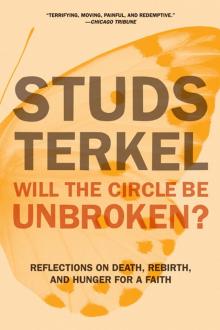 Will the Circle Be Unbroken?
Will the Circle Be Unbroken?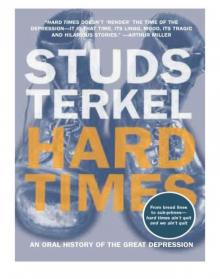 Hard Times
Hard Times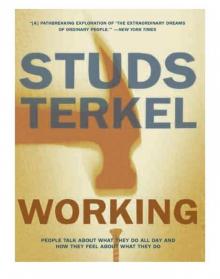 Working
Working Touch and Go
Touch and Go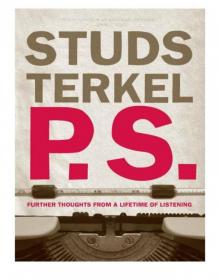 P.S.
P.S.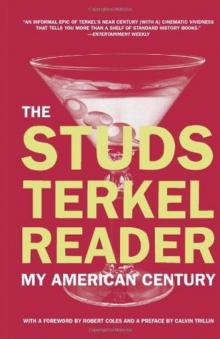 The Studs Terkel Reader_My American Century
The Studs Terkel Reader_My American Century